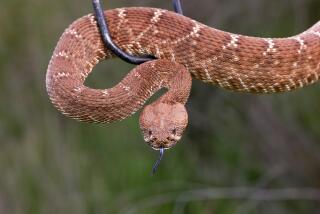Snake handlers give some Christians the creeps

There’s a fair amount of snark online Monday about Jamie Coots, the Pentecostal pastor and reality-TV star who was fatally bitten by a snake he was handling in over-literal adherence to Luke 10:19. (“Behold, I give unto you power to tread on serpents and scorpions, and over all the power of the enemy: and nothing shall by any means hurt you.”)
An atheist website offered this tasteless observation: “Pentecostal preachers are among the most poisonous creatures on Earth, but every once in while they bump into things even more venomous.”
But even fellow Christians are finding fault with Coot for misinterpreting Scripture or presuming to test God. A friend of mine suggested that the biblical injunction that inspired Coot to handle a serpent should be properly read to mean that if a believer happens to come across a snake, God will step in, but that doesn’t mean you should seek out the critters.
Even if you embrace that more moderate interpretation, the death of the snake handler is a reminder that the Jesus of the Gospels spoke in a supernatural vocabulary that doesn’t come naturally to 21st century people, including a lot of Christians.
Take Jesus’ words (and deeds) in connection with the devil. In the Gospel of Mark, Jesus links Satan and serpents, proclaiming: “In my name shall they cast out devils; they shall speak with new tongues; they shall take up serpents; and if they drink any deadly thing, it shall not hurt them.”
Yet the eyebrows of plenty of sophisticated Christians were raised when Supreme Court Justice Antonin Scalia affirmed in an interview last year that he believed in the devil. “Hey, c’mon, that’s standard Catholic doctrine,” he told his incredulous interviewer. “Every Catholic believes that.”
Actually, 74% of American Catholics do, according to a Harris poll. But how many of them expect to come across a case of demonic possession (outside a movie theater)? Not many, I suspect. But in the Gospels, demons are everywhere. So, of course, are miracles, but many contemporary Catholics are operational disbelievers in the miraculous, in the sense that they don’t expect to see water transformed into wine or oceans part.
A lot of today’s Christians find snake handlers disturbing not just because they seem to test God but because they believe that irruptions of the divine in daily life are commonplace and to be relied on. According to this view, miracles may have been thick on the ground in Jesus’ time, but that was then and this is now.
Other Christians aren’t sure that miracles were all that common even back then, and regard Satan and his minions as metaphors for evil. (That may be the case with the 26% of Catholics who said they didn’t believe the devil was real). For both groups, snake handlers are an embarrassment.
ALSO:
The wrong way to fix Obamacare
McManus: The tea party grows up
Follow Michael McGough on Twitter @MichaelMcGough3
More to Read
A cure for the common opinion
Get thought-provoking perspectives with our weekly newsletter.
You may occasionally receive promotional content from the Los Angeles Times.







